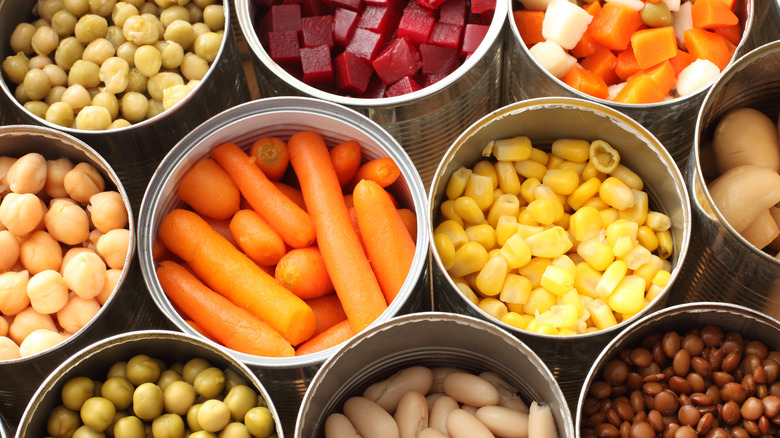The Biggest Canned Food Myth You Need To Stop Believing
Since its invention in the early 1800s after a challenge from Napoleon, canned food has become an industry that will exceed $100 billion by the end of the decade. Regardless of soaring sales, the perception in modern times isn't exactly sterling; many people see canned goods as less than fresh. There are certainly reasons you'd want to use fresh food, and we sometimes arguably take canning too far (as in canned full English breakfast). But beyond that, people fall for a lot of myths about canned food.
One of the biggest of these is nutritional differences. There's a perception that canned food has less nutritional value than fresh food. This, however, (almost always) isn't true; the whole point of canning is to preserve food at its freshest point. Nutrients don't simply leak out, because with properly canned food, nothing is going to escape. Though you might prefer the taste or texture of fresh food, you don't have to worry about a canned ingredient being inherently unhealthier than its fresh counterpart.
Most nutrients are unaffected by the canning process
Sealing food in an airtight container to prevent it from going bad is quite literally the entire point of canning. This is the science behind why canned foods are always cylindrical: Round shapes are better at withstanding pressure, making them less likely to burst, leak, or suffer damage.
Because cans are designed to be airtight, the nutrition in food doesn't go anywhere when it's canned. Vegetables are generally canned right after harvest, at facilities located near where they're grown or produced, specifically to ensure as much freshness as possible. Fat-soluble vitamins, proteins, fats, and carbohydrates are unaffected by the canning process, and are thus preserved in amounts essentially identical to their fresh counterparts.
There's also a belief that canned goods are naturally higher in salt, but this is false. While salt and sugar are sometimes added to the canning process, they don't need to be. The belief here seems to stem from salt's common usage as a preservative. However, the canning process is what preserves the food, so salt doesn't have to be added (when it is, it's typically done for flavor reasons). If you're concerned about sodium consumption, most canned goods have low-sodium or sodium-free versions.
Water-soluble vitamins are the exception here
There's one caveat to canned goods retaining nutritional value: Vitamins C and B. Because the canning process involves high levels of heat to kill off bacteria and vitamins C and B are water-soluble, they can be lost during canning. Then again, the same thing can happen when you cook with them; these two vitamins are finicky little creatures at the best of times. On the other hand, this process can also work in the other direction. When tomatoes or corn are heated, they release additional antioxidants.
In brief, while there are plenty of reasons to pick fresh or frozen foods over canned varieties, nutrition generally isn't one of them. Unless you're especially concerned with the loss of water-soluble vitamins, there's no nutritional reason to stress about whether or not your dinner came out of a can. So stock up that pantry and don't worry about the nutrient levels.


